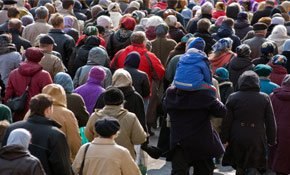John Humphrys asks: Can Britain deal with expected population growth?
Britain’s population is going to increase by almost ten million in the next twenty five years. That, at least, is the forecast made by the Office for National Statistics in a report just published. It says, in effect, that we shall have to accommodate an extra number of citizens roughly equal to the current population of London. Can it be done? And should it be done?
All forecasting is hazardous and none more so than predicting the population. There are just too many unpredictable features of human behaviour to allow it to be an exact science. It’s not so long ago that demographers were telling us that our numbers would fall. Nonetheless, the statisticians at the ONS have come up with a forecast very much in line with what others have been predicting recently and with what the rest of us see happening around us.
Their forecast covers the period between 2012 will grow by 14%, from 63.7 million last year to 73.3 million in 2037, crossing the 70 million milestone around 2027. That increase of 9.6 million compares with a growth of only 6.8 million over the last twenty five years.
A fair bit of this increase is due to increased life expectancy. In 2037 the number of those entitled to a state pension (even allowing for the later entitlement age that government has introduced) will grow by a third, to 16.1 million. There will be six million people aged eighty or over, double the number now. There will be an astonishing 110,000 centenarians, compared with only 13,000 last year and a mere 100 in 1917, when the then monarch, George V, started the tradition of sending a telegram to people on their hundredth birthday. The number of women aged 105 or over, which was just under 300 last year, is expected to be just over 3,000 in 2037.
In short we have a rapidly ageing population. Life-expectancy for people reaching 65 is now a further 18.3 years for men and 20.6 years for women. The average age of our fellow citizens will rise from 39.7 last year to 42.8 in a quarter of a century.
But although living longer is a big reason for the population growth it is not the main reason. Around 60% of the prospective increase is due to immigration. In more specific terms, the ONS says that 43% of the overall increase will be directly due to net future migration and 17% to the indirect effect of greater fertility among immigrants. This large immigration effect on the size of the population is predicted notwithstanding the fact that the ONS acknowledges the recent fall in net migration following government efforts to bring the numbers down. Last year net migration into Britain was 176,000, down from a peak of 225,000.
Some people reading this report will come to a quick conclusion. They will say that we simply can’t absorb an increase in population that’s tantamount to building another London in a mere twenty five years and that therefore we must be much stricter in limiting immigration. But things may not be quite that simple.
One of the effects of the ageing of the population is that, according to the ONS, the ratio of working-age adults to pensioners will fall from 3.21 in 2012 to 2.74 in 2037. In other words the burden of supporting pensioners on those still in work will become considerably greater. Two things follow from this. One is that people will have to work longer in old age if the economy is to grow sufficiently to support this elderly population. And secondly, in order for the ratio not to be even worse we shall depend on a flow of immigrants on the scale the ONS forecasts. That’s because, overwhelmingly, immigrants are of working age.
But if, on this argument, the immigrant flow is necessary simply to keep the economy growing at the rate that’s needed, there are other consequences that will need to be faced. The most obvious is the increased pressure that the larger population will exert on public services. The ONS forecasts, for example, that the number of primary school places will need to increase by 13% over the period.
Also, this increased population will need to be housed. But even on current numbers we are having severe problems accommodating everyone, as increasing house prices and rents demonstrates. Attempts to solve the problem by abandoning planning rules in order to build more houses are already causing a huge backlash on the part of those who fear the concreting over of our countryside. That conflict is certain to become even more intense. There is also the issue of whether increased immigration on this scale can happen without problems of integration becoming much more acute than they have so far been.
In the light of all this, it is not surprising that population growth and, more specifically, immigration have become core political issues. The success of UKIP is regarded as being as much due to its opposition to immigration as it is to its policy of taking Britain out of the European Union (policies that are intimately related to each other). The other mainstream parties are all, to some extent, tightening their rhetoric on immigration as a result.
The government is taking measures to restrict non-EU immigration but it can do very little on immigration from other EU countries, all of whose citizens have the right to live and work wherever they please within the European Union. That right will be extended to Romanians and Bulgarians from the New Year and no one has any real idea how many of them will choose to come and work here.
The Prime Minister, of course, has said that if a Tory government is returned at the next election he will seek a renegotiation of Britain’s terms of membership with the EU. But few people expect that he could do much about the free movement of labour which enshrines the right of EU citizens to live and work where they want. The most that might be achievable is to limit EU immigrants’ access to benefits, though most informed observers think this would have only a limited effect on the numbers coming to this country.
The simplest conclusion to be drawn from the ONS report is that if we are to enjoy the benefits of greater life expectancy, then we shall have to put up with the price. That price is a fast-growing population without which the elderly cannot live in anything like the style of life we enjoy now. But further, if we accept that price, then we must also accept that a substantial part of that increased population will be made up of immigrants and, over time, their children. And we shall have to adapt our policies on housing, education and much else to accommodate them.
Are we prepared to do all that? Or do we want to say that Britain is already full up and, whatever it may mean for the future of our economy and the welfare of our elderly, we want to try and stop the increase from happening?










